英语六年级一般疑问句精ppt课件
- 格式:ppt
- 大小:121.00 KB
- 文档页数:12
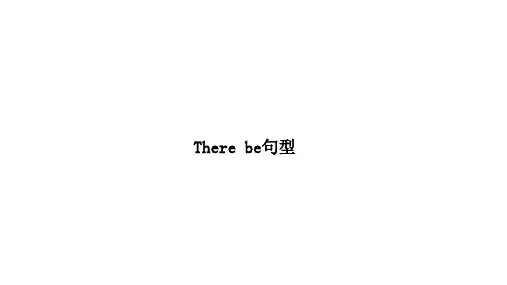
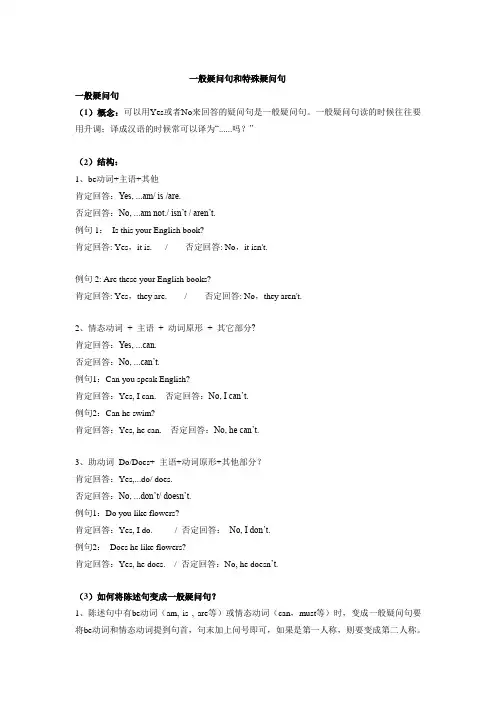
一般疑问句和特殊疑问句一般疑问句(1)概念:可以用Yes或者No来回答的疑问句是一般疑问句。
一般疑问句读的时候往往要用升调;译成汉语的时候常可以译为“......吗?”(2)结构:1、be动词+主语+其他肯定回答:Yes, ...am/ is /are.否定回答:No, ...am not./ isn’t / aren’t.例句1:Is this your English book?肯定回答: Yes,it is. / 否定回答: No,it isn't.例句2: Are these your English books?肯定回答: Yes,they are. / 否定回答: No,they aren't.2、情态动词+ 主语+ 动词原形+ 其它部分?肯定回答:Yes, ...can.否定回答:No, ...can’t.例句1:Can you speak English?肯定回答:Yes, I can. 否定回答:No, I can’t.例句2:Can he swim?肯定回答:Yes, he can. 否定回答:No, he can’t.3、助动词Do/Does+ 主语+动词原形+其他部分?肯定回答:Yes,...do/ does.否定回答:No, ...don’t/ doesn’t.例句1:Do you like flowers?肯定回答:Yes, I do. / 否定回答:No, I don’t.例句2:Does he like flowers?肯定回答:Yes, he does. / 否定回答:No, he doesn’t.(3)如何将陈述句变成一般疑问句?1、陈述句中有be动词(am, is , are等)或情态动词(can,must等)时,变成一般疑问句要将be动词和情态动词提到句首,句末加上问号即可,如果是第一人称,则要变成第二人称。
例如:She is a clever girl. → Is she a clever girl?I can swim. → Can you swim?2、句子里面含有实义动词(如like, likes, have,has, run, swim, jump等)。
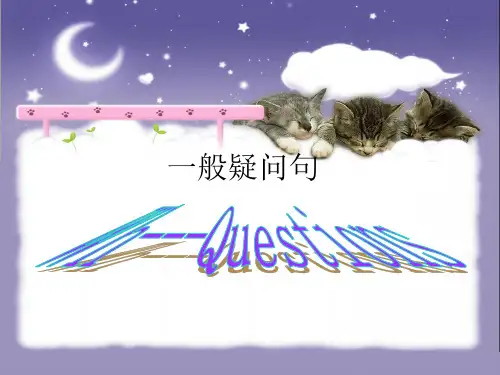
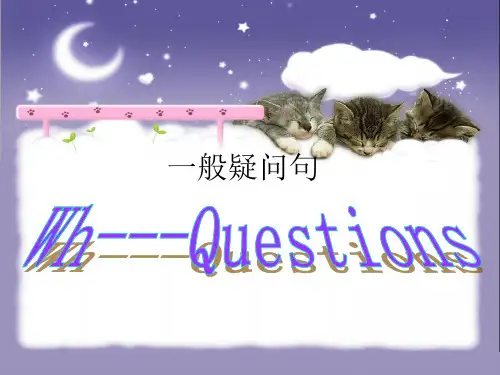

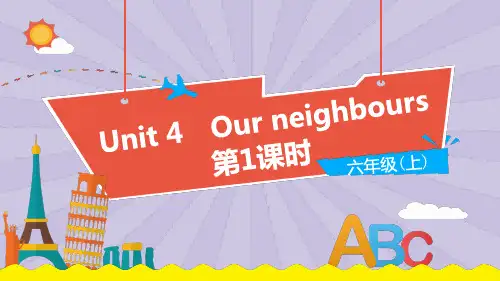


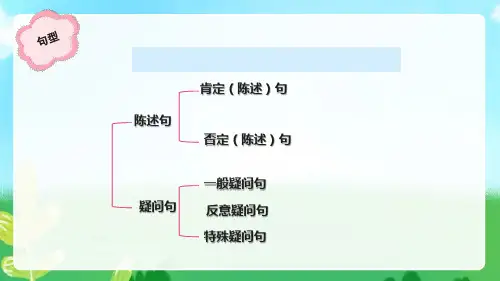

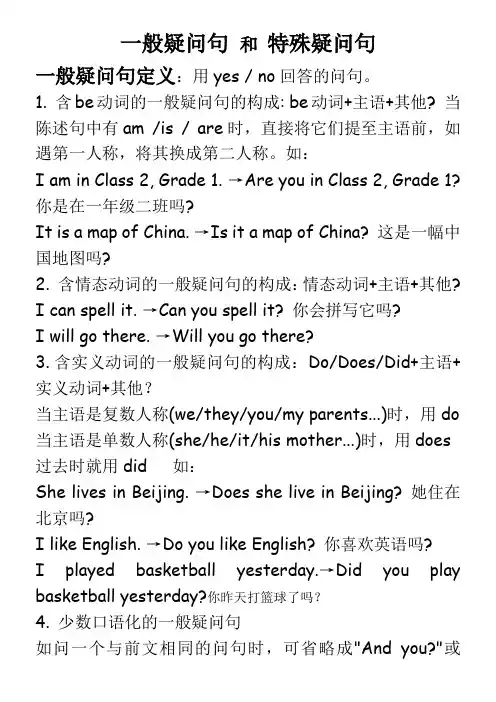
一般疑问句和特殊疑问句一般疑问句定义:用yes / no回答的问句。
1. 含be动词的一般疑问句的构成: be动词+主语+其他? 当陈述句中有am /is / are时,直接将它们提至主语前,如遇第一人称,将其换成第二人称。
如:I am in Class 2, Grade 1. →Are you in Class 2, Grade 1? 你是在一年级二班吗?It is a map of China. →Is it a map of China? 这是一幅中国地图吗?2. 含情态动词的一般疑问句的构成:情态动词+主语+其他?I can spell it. →Can you spell it? 你会拼写它吗?I will go there. →Will you go there?3.含实义动词的一般疑问句的构成:Do/Does/Did+主语+实义动词+其他?当主语是复数人称(we/they/you/my parents...)时,用do 当主语是单数人称(she/he/it/his mother...)时,用does 过去时就用did 如:She lives in Beijing. →Does she live in Beijing? 她住在北京吗?I like English. →Do you like English? 你喜欢英语吗?I played basketball yesterday.→Did you play basketball yesterday?你昨天打篮球了吗?4. 少数口语化的一般疑问句如问一个与前文相同的问句时,可省略成"And you?"或"What / How about...?"等;甚至只抓关键词,读作升调。
如:Your pen? 你的钢笔?5. 大部分的一般疑问句都应读作升调(↗),并落在最后一个单词身上。
如:Is it a Chinese car↗?6. 一般疑问句的应答用yes / no(或相当于yes / no的词)回答,并怎么问怎么答(句首为情态动词am / is / are还是do /does),简略回答时要注意缩写(否定的n't)和采用相应的人称代词以避免重复:即"Yes,主语(代词)+情态动词或am / is / are或do / does."表示肯定;"No,主语(代词)+情态动词或am / is / are 或者do / does not(n't)."表示否定.如:① Is Mary a Japanese girl? 玛丽是日本女孩吗? Yes, she is. / No, she isn't. 是的,她是。
六年级英语比较级和一般疑问句例题解析▲形容词和副词的比较级(1) 一般在形容词或副词后+erolder taller longer stronger, etc(2) 多音节词前+moremore interesting, etc.(3) 双写最后一个字母,再+erbigger fatter, etc.(4) 把y变i,再+erheavier, earlier(5) 不规则变化:原级比较级good好的better更好的well好;(身体)好的,bad,badly糟糕的,糟糕地worse更糟糕的,更糟糕地;(身体)更不舒服的ill(身体)不舒服的many许多的(可数)more更多的;更much许多的(不可数);非常little少的less更少的far远的;远地farther更远的;更远地further进一步的(地)(6)、形容词和副词的原级、比较级的用法:(1)讲述某人/物自身的情况时,用原级。
基本句型是:主语(sb./sth) + 谓语动词 + (very/too/so/quite/rather…) + 形容词/副词原级 +….如:He is very old now.(他现在很老了) / They ran quite fast.(它们跑得相当快) / The weather looks rather bad.(天气看上去相当糟) / I am so happy!(我是如此的快乐) ☆表示两者之间没有差别时,使用句型:主语(第一个人物) + 谓语动词 + as + 形容词/副词原级 + as + 第二个人物 +….如:He is as excited as his younger sister.(他和他妹妹一样兴奋)/ Lily rode her bike as slowly as an old lady.(莉莉骑车像老太太一样慢)/ They picked as many applesas the farmers (did).(他们摘的苹果和农民一样多)☆表示第一个人比不上第二个人时,使用句型:主语(第一个人物) + 谓语动词(否定式) + as / so + 形容词/副词原级 + as + 第二个人物+….如:He is not so / as excited as his younger sister.(他没他妹妹那么兴奋) / Lily did not ride her bike so / as slowly as an old lady. (莉莉骑车不像老太太那样慢) / They didn’t pick so / as many apples as the farmers (did). (他们摘的苹果不如农民多)(2) 讲述两者有差异,第一个人物超过第二个人物时,用比较级。
小升初句型专题复习——陈述句&一般疑问句一、知识点讲解:重点、考点:I、陈述句:陈述句是陈述一个事实、一个意念或看法的句子,可分为“肯定陈述句”和“否定陈述句”。
陈述句的语序一般为:主语+谓语动词,或主语+连系动词+表语。
(一)陈述句的肯定式陈述句的肯定式即肯定陈述句,它的谓语结构中不含否定词,e.g.:He is a student. Mr. Black will go Dongguan on business tomorrow.他是一个学生。
布莱克先生明天将去东莞出差。
e.g.: She lives in Nanjing. Jane bought some new clothes yesterday.她住在南京。
珍妮昨天买了一些新衣服。
I can swim. 我会游泳。
(二)陈述句的否定式陈述句的肯定式即否定陈述句,它的谓语结构中含有否定词如not (不),no (不,没有),never (从不)e.g.: He never goes to work late. She didn’t find her book.他上班从来不迟到。
她没有找到她的书。
This is not my bag. He won’t get up early tomorrow morning.这不是我的包。
他明天早上将不会早起。
I can’t swim. We have no school on Saturday and Sunday.我不会游泳。
我们星期六和星期天不上学。
2.将肯定句改为否定句的方法1)如果句子中有be动词(am, is, are, was, were)、情态动词(will, can, could, must, may等)的时候,只需要在这些词后面加not。
例如:(1) My father is an English teacher. 我父亲是一位英语老师。
> My father is not (= isn’t) an English teacher.(2) There were many trees in our school two years ago. 两年前我们学校有很多树。